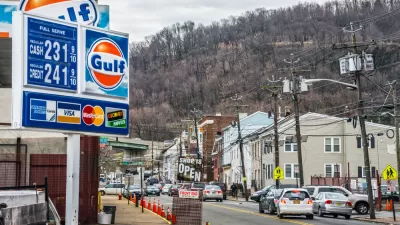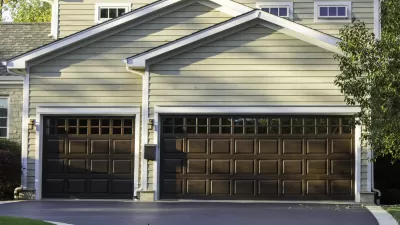After peaking in 2007, new research shows that the rate of vehicle ownership in the U.S. took a dive over the next five years. Researchers argue the growth in car-free households suggests the country has surpassed peak motorization.
New research by Michael Sivak for the University of Michigan Transportation Research Institute [PDF] indicates that the rate of vehicle ownership by the average American household dropped from a high of 2.07 in 2007 to 1.98 by the end of 2012. This may not sound like much, but when considered in the context of other downward trends in miles driven and fuel consumption, Sivak sees a growing consensus that "motorization in the U.S. might have reached a peak several years ago."
Sivak's research also documents the concurrent rise in the percentage of car-free households in 21 of America's 30 largest cities, notes Angie Schmitt. "Growth in car-free households reflects a number of local factors, including the quality of transit, walkability, and income levels, among other factors, according to Sivak. But he says wider social trends are at work as well."
FULL STORY: The American Cities With the Most Growth in Car-Free Households

Planetizen Federal Action Tracker
A weekly monitor of how Trump’s orders and actions are impacting planners and planning in America.

Congressman Proposes Bill to Rename DC Metro “Trump Train”
The Make Autorail Great Again Act would withhold federal funding to the system until the Washington Metropolitan Area Transit Authority (WMATA), rebrands as the Washington Metropolitan Authority for Greater Access (WMAGA).

The Simple Legislative Tool Transforming Vacant Downtowns
In California, Michigan and Georgia, an easy win is bringing dollars — and delight — back to city centers.

The States Losing Rural Delivery Rooms at an Alarming Pace
In some states, as few as 9% of rural hospitals still deliver babies. As a result, rising pre-term births, no adequate pre-term care and "harrowing" close calls are a growing reality.

The Small South Asian Republic Going all in on EVs
Thanks to one simple policy change less than five years ago, 65% of new cars in this Himalayan country are now electric.

DC Backpedals on Bike Lane Protection, Swaps Barriers for Paint
Citing aesthetic concerns, the city is removing the concrete barriers and flexposts that once separated Arizona Avenue cyclists from motor vehicles.
Urban Design for Planners 1: Software Tools
This six-course series explores essential urban design concepts using open source software and equips planners with the tools they need to participate fully in the urban design process.
Planning for Universal Design
Learn the tools for implementing Universal Design in planning regulations.
Smith Gee Studio
City of Charlotte
City of Camden Redevelopment Agency
City of Astoria
Transportation Research & Education Center (TREC) at Portland State University
US High Speed Rail Association
City of Camden Redevelopment Agency
Municipality of Princeton (NJ)





























